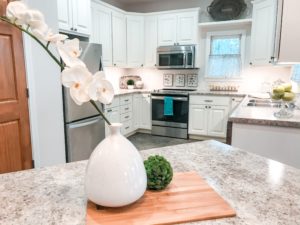As Americans increasingly live longer and healthier lives, many are weighing the pros and cons of moving to a retirement community or staying in their own home. Regardless of whether you choose to move to a senior living community, you can remain independent longer. Read on to learn more about staying independent as you age and types of living solutions that can help.
Planning to Age Independently
Having a plan is essential to remaining independent longer, according to the National Institute on Aging.
- First, think about the assistance you might want or need in the coming years. What are your biggest concerns about remaining at home? How will you get around at home and in town? How will you find activities and social engagement?
- Consider any illnesses that you or your spouse have. Talk to your doctor about how these conditions could affect caring for yourself or your spouse in the future.
- Familiarize yourself with community and local government resources. You may start with your local Area Agency on Aging or senior center. If you belong to a religious group, talk with clergy about the services they offer for older adults.
Even if you don’t need help now, you may have a family member who does. Every person’s situation is unique, so work through specific concerns with your trusted loved ones and healthcare professionals.
The American Society on Aging and the National Institute on Aging offer the following helpful tips on how to successfully remain at home as you age:
- Don’t use throw rugs. Ensure all carpets are fixed firmly to the floor. Also, reduce fall hazards by placing no-slip strips or nonskid mats on tile and wood floors and surfaces that may get wet.
- Install grab bars near toilets and in the tub or shower. Replace handles on doors or faucets with ones that are comfortable for you to use.
- Install a ramp with handrails to the front door.
- Place light switches at the top and bottom of stairs and use night lights. Additionally, place lamps and keep your cellphone or a cordless phone within easy reach of your bed or favorite chair and keep a flashlight close to the bedside and another in the kitchen in case of emergencies.
- Ensure clear pathways between the bedroom and bathroom.
- Keep a printed list of emergency and family phone numbers in large font, inserted in a clear plastic sleeve, close to the telephone, in the bedroom and/or kitchen.
Aging in Community
Social isolation and loneliness are associated with a higher risk of mortality in adults age 52 and older, according to the Proceedings of the National Academy of Sciences. United Church Homes’ prescription is to build communities where residents’ physical, mental, emotional and spiritual health needs are met. By caring for the whole person, we create environments of abundant aging for those we serve.
The benefits of moving to an independent senior living community are extensive. Some of the tools that help older adults live at home longer are new technological solutions, home modifications, fee-based transportation services, in-home assistance and more. For those who don’t have access to these supports, moving to a retirement community may be a better option.

If you haven’t visited a senior living community recently, you may have some misconceptions about living in these communities that have changed significantly over the last few years. You may be drawn to the carefree retirement lifestyle of independent living, trading home and lawn maintenance for an active, vibrant lifestyle and sense of community.
The transition to a senior living community can help older adults stay independent longer. These communities foster human connection through a full calendar of activities and events that can improve quality of life for older adults and encourage finding one’s purpose and growing at all ages.
If you’re concerned about grocery shopping or nutritious meal preparation, you may want to consider a United Church Homes retirement community. Many older adults who live alone may not be eating right. At a UCH senior living community, you can enjoy restaurant-style fine dining every day of the week.
In a UCH life plan community, residents who need higher levels of care can get it without moving from their community. Living options include independent living, assisted living, long-term care, short-term rehabilitation and specialized memory care services. All UCH communities practice person-directed care, so residents participate fully in the decisions about their day-to-day lives.
To find a United Church Homes senior living community near you, visit https://www.unitedchurchhomes.org/communities/.
